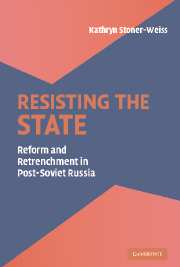Book contents
- Frontmatter
- Contents
- Acknowledgments
- Note on Transliteration
- Resisting the State
- 1 W(h)ither the Russian State?
- 2 Apparatchiki into “Entrepreneurchiki”: The Sources of Russia's Weak Central State
- 3 Governing Russia: Patterns of Regional Resistance to the Central State
- 4 Inside the Russian State: Assessing Infrastructural Power in the Provinces
- 5 Retrenchment over Reform: Obstacles to the Central State in the Periphery
- 6 Weak National Parties, Weak Central State
- 7 The Comparative Implications of Russia's Weak State Syndrome
- Index
3 - Governing Russia: Patterns of Regional Resistance to the Central State
Published online by Cambridge University Press: 25 July 2009
- Frontmatter
- Contents
- Acknowledgments
- Note on Transliteration
- Resisting the State
- 1 W(h)ither the Russian State?
- 2 Apparatchiki into “Entrepreneurchiki”: The Sources of Russia's Weak Central State
- 3 Governing Russia: Patterns of Regional Resistance to the Central State
- 4 Inside the Russian State: Assessing Infrastructural Power in the Provinces
- 5 Retrenchment over Reform: Obstacles to the Central State in the Periphery
- 6 Weak National Parties, Weak Central State
- 7 The Comparative Implications of Russia's Weak State Syndrome
- Index
Summary
As noted in Chapter 1, historically Russia has always presented distinctive governing challenges. As far back as Ivan the Terrible, Russian rulers have lamented the great distances between Russian administrative outposts and the obstacles to coherent state policies this distance alone presented. Perhaps, then, it should come as little surprise that successive leaders of the contemporary Russian state have faced frustration in trying to convey authority across this vast expanse. Adding to the difficulties presented by Russian geography is the fact that population density (8.5 people per square km) is among the lowest in the world, and communications infrastructure even in the twenty-first century is often primitive to say the least.
Yet, while the challenges of Russia's geography have been more or less constant throughout its long history, different regimes have had varying degrees of success in conveying state authority across territory. In the immediate post-Soviet period, however, the central state faced particularly widespread and persistent challenges to its authority beyond the Kremlin walls. This chapter begins by very briefly exploring the main mechanisms by which the Russian periphery was ruled during the Soviet period. This section contrasts the hypercentralization of the Soviet period with the rapid decentralization and sharply reduced governing capacities of the late Soviet and then post-Soviet Russian state in the first decade following the Soviet collapse. The chapter then moves to an examination of the patterns of regional defiance of central authority across time, policy area and region.
- Type
- Chapter
- Information
- Resisting the StateReform and Retrenchment in Post-Soviet Russia, pp. 44 - 76Publisher: Cambridge University PressPrint publication year: 2006



